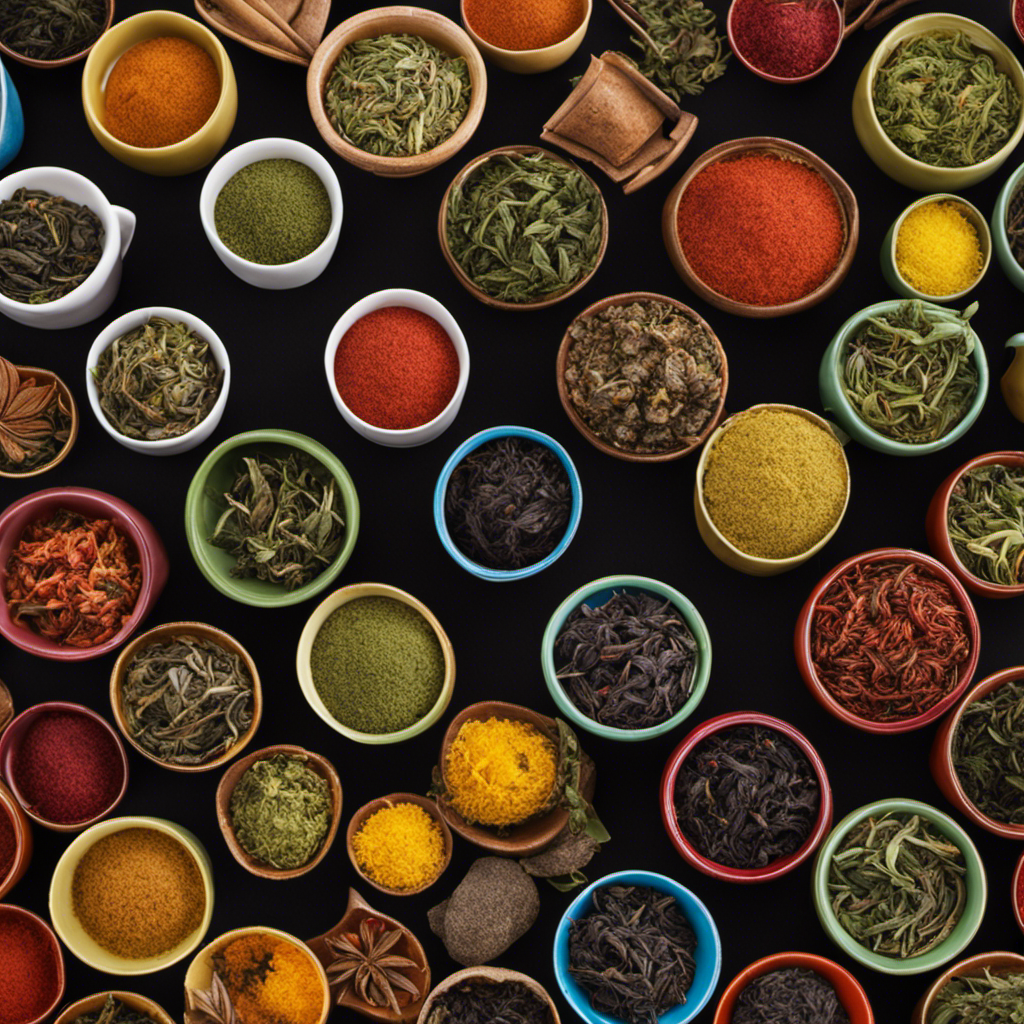Turmeric Tea
How To Make And Turmeric Tea

I love starting my day with a warm cup of turmeric tea. Not only is it delicious, but it also has numerous health benefits. Turmeric contains curcumin, a powerful antioxidant and anti-inflammatory compound that can boost your immune system and improve your overall wellbeing.
Making turmeric tea at home is simple and affordable. All you need are a few basic ingredients and tools, such as fresh or powdered turmeric, ginger, black pepper, honey or lemon to taste, and a pot or kettle to boil water.
In this article, I will show you how to make a basic turmeric tea recipe and share tips on how to customize it to suit your preferences. So grab your favorite mug and let’s get started!
Key Takeaways
- Turmeric tea contains curcumin, a powerful antioxidant and anti-inflammatory compound, which can aid in various health issues such as joint pain, inflammation, and cancer-fighting abilities.
- Making turmeric tea is simple and affordable using basic ingredients like fresh or powdered turmeric, ginger, black pepper, honey or lemon, and a pot or kettle to boil water. Different variations can be made by adding spices like ginger or cinnamon, or customizing it with milk or honey for added flavor and health benefits.
- Turmeric has other uses besides being consumed as tea, such as becoming increasingly popular in skincare due to its antioxidant and anti-inflammatory properties, or being used as a natural dye for fabrics or hair.
- Precautions should be taken when consuming turmeric, as some people may experience allergic reactions or interactions with certain medications. Experimentation may be needed to find the perfect recipe for individual preferences and tastes.
Benefits of Turmeric Tea
You’ll love sipping on turmeric tea because it’s packed with benefits. It can reduce inflammation, aid digestion, and boost your immune system. Turmeric contains curcumin, a compound known for its anti-inflammatory properties. This can help reduce swelling and pain in the body. Inflammation is linked to many chronic diseases such as cancer, heart disease, and diabetes. Drinking turmeric tea regularly can help keep these conditions at bay.
In addition to reducing inflammation, turmeric tea can also boost your immune system. Curcumin has been shown to enhance the activity of immune cells in the body. This helps fight off infections and diseases. It also has antioxidant properties that protect against free radicals that damage cells and contribute to aging.
To reap the full benefits of turmeric tea, it’s important to choose the right type of turmeric. Look for organic or wildcrafted options that are free from pesticides or other harmful chemicals. You can also opt for fresh turmeric root instead of powder for a more potent dose of curcumin. With proper preparation and ingredients, you’ll be able to enjoy all the health benefits this powerful spice has to offer.
Choosing the Right Turmeric
When it comes to choosing the right turmeric for my tea, I always consider whether to use fresh or powdered. Fresh turmeric has a stronger flavor, but it can be harder to find and prepare.
On the other hand, powdered turmeric is more convenient and easier to measure, but its potency may vary depending on how long it has been stored.
In addition, I prefer organic turmeric whenever possible because it’s free from harmful chemicals and pesticides that could potentially harm my health.
Fresh vs. powdered turmeric
Using fresh turmeric root will give your tea a more vibrant and robust flavor, whereas powdered turmeric provides a convenient option for those without access to fresh ingredients.
One of the main differences between using these two forms of turmeric is that fresh turmeric has a higher water content than its powdered counterpart. This means that when cooking with fresh turmeric, you’ll need to use more of it to achieve the same level of intensity as you would with the dried powder.
However, both forms have their advantages. Fresh turmeric contains higher levels of curcumin, which is responsible for many of its health benefits. On the other hand, using powdered turmeric can be more cost-effective and easier to store for longer periods.
When deciding which form to use in your tea, consider what’s available to you and what flavor profile you’re looking for in your beverage.
Now, let’s move on to discussing organic vs. non-organic options for your turmeric tea.
Organic vs. non-organic
If you want to ensure that your turmeric has been grown without harmful pesticides and chemicals, consider choosing organic options for your tea. Organic turmeric is typically cultivated using natural farming methods, which rely on composting, biological pest control, and crop rotation to maintain soil health. This means that your turmeric may contain more nutrients and antioxidants than non-organic varieties.
Choosing organic turmeric can also help address potential health concerns associated with the consumption of non-organic produce. Pesticide residue on non-organic foods has been linked to a variety of negative health effects, including cancer, reproductive issues, and neurological problems.
By selecting organic options for your tea ingredients, you can reduce your exposure to these harmful chemicals while enjoying the many benefits of turmeric tea.
To make a delicious cup of turmeric tea, you’ll need a few simple ingredients and tools.
Ingredients and Tools Needed
To make turmeric tea, all you need is water, ground turmeric, honey, lemon juice, a small saucepan, and a spoon. These ingredients are easy to find in your local grocery store or health food store.
Turmeric has been used for centuries in Ayurvedic medicine and has gained popularity due to its numerous health benefits such as reducing inflammation and aiding digestion. When brewing turmeric tea, it’s important to note that the longer you steep the turmeric in hot water, the stronger the flavor will be. Some people prefer to boil the water with the turmeric first for added potency.
Additionally, adding honey and lemon juice not only enhances the flavor but also provides additional health benefits. Honey can help soothe sore throats while lemon juice is high in vitamin C which helps boost immunity.
Now that we know what ingredients we need and how to brew our tea properly let’s move on to our basic recipe. It’s simple really; In a small saucepan bring 2 cups of water to a boil then add 1 teaspoon of ground turmeric powder. Reduce heat and let simmer for about 10 minutes.
Remove from heat then strain into your favorite mug before adding honey (to taste) and a squeeze of fresh lemon juice.
Basic Turmeric Tea Recipe
So now that we’ve got our ingredients and tools ready, let’s dive into making a basic turmeric tea.
First, I boil some water in a pot and add about a teaspoon of ground turmeric to it. Once the turmeric has dissolved, I let it steep for about 5 minutes before straining it into my mug.
Depending on your preference, you can then add honey, lemon, or milk to taste.
Boiling water and adding turmeric
Once the water has reached boiling point, simply sprinkle in a pinch of turmeric like fairy dust and watch as it transforms into a golden elixir. Boiling techniques can vary depending on your preference, but generally, it is best to use filtered or distilled water to prevent any impurities from affecting the taste. You can also experiment with different tea variations by adding ginger or cinnamon for added flavor and health benefits.
To make sure you get the most out of your turmeric tea, I have included a table that outlines some of its many benefits. Turmeric contains curcumin, which is known for its anti-inflammatory properties and can help with joint pain and arthritis. It also aids in digestion, helps boost immunity, lowers cholesterol levels, and even has potential cancer-fighting abilities.
Now that we have our basic recipe down pat let’s move on to the next step – adding honey, lemon, or milk to enhance both the flavor and nutritional value of our turmeric tea.
Adding honey, lemon, or milk
Enhance the flavor and nutritional value of your turmeric elixir by adding a drizzle of honey, a squeeze of fresh lemon juice, or a splash of creamy milk. These simple additions can transform a basic cup of turmeric tea into a delicious and satisfying beverage with additional health benefits.
Adding spices like cinnamon, ginger, or cardamom can also elevate the taste profile while providing even more therapeutic properties.
Tea bags can be added to the mix for convenience, or you can experiment with blending turmeric with other herbs like chamomile or peppermint for added soothing effects. It’s important to note that different brewing methods will have varying effects on the potency and flavor of your turmeric tea, so it may take some trial and error to find your perfect recipe.
When you’re ready to customize your turmeric tea even further, there are plenty of options available! From adjusting the amount of honey or lemon juice to trying out different milk alternatives like almond or coconut milk, there’s no shortage of ways to make this drink uniquely yours.
So let’s explore some tips for customizing your turmeric tea and creating a beverage that is both delicious and beneficial for your body.
Tips for Customizing Your Turmeric Tea
You can easily customize your turmeric tea by adding a touch of honey or lemon for added flavor. These additions aren’t just tasty, but they also come with their own set of health benefits.
Honey’s known to have antibacterial properties and can soothe sore throats, while lemon’s rich in vitamin C and antioxidants. Another way to customize your turmeric tea is by experimenting with different herbal blends.
Many herbs and spices complement the earthy flavor of turmeric, such as ginger, cinnamon, cardamom, and black pepper. You can try adding these spices to create unique flavor profiles that suit your taste buds.
Lastly, don’t be afraid to get creative with your turmeric tea! You can add milk or coconut milk for a creamy texture or even use it as a base for a latte. The possibilities are endless when it comes to making this healthy beverage your own.
Now that you know how to customize your turmeric tea, let’s talk about how you can store it for optimal freshness.
Storing Turmeric Tea
Now that I’ve learned how to make the perfect cup of turmeric tea, it’s important for me to know how to properly store any leftover tea.
One option is to refrigerate it in an airtight container for up to three days.
Another option is freezing fresh turmeric root for later use in making tea or other recipes.
By following these storage tips, I can ensure that my turmeric tea stays fresh and delicious every time I enjoy it.
Refrigerating leftover tea
If you want to keep your leftover turmeric tea fresh and flavorful, pop it in the fridge! Storing the tea in airtight containers or jars will prevent spoilage and maintain its quality for up to 3 days. However, be sure to drink it within this timeframe as leaving it for too long may cause bacteria growth.
There are many uses for leftover turmeric tea. You can add it to smoothies, use it as a base for soups or stews, or simply reheat and enjoy as is. But if you know that you won’t be able to consume the remaining tea within 3 days, consider freezing it instead of refrigerating.
Freezing turmeric root
To preserve turmeric root for future use, simply peel and chop it into small pieces before placing them in a freezer-safe bag or container. Freezing turmeric root is an excellent way to preserve its freshness and potency.
Here are some benefits of freezing turmeric that you should know:
- Freezing helps to retain the flavor and aroma of the spice.
- Frozen turmeric can be used directly in recipes without thawing.
- You can freeze turmeric for up to six months without losing its beneficial properties.
- Frozen turmeric is perfect for making tea, smoothies, curries, and other dishes.
Creative uses for frozen turmeric root include adding it to your morning smoothie, grating it over roasted vegetables or rice dishes, or using it as a base for homemade curry paste.
Now that you know how to freeze turmeric root, let’s move on to other creative ways you can incorporate this healthy spice into your diet!
Other Uses for Turmeric
Turmeric is a versatile spice that can add health benefits and depth of flavor to many dishes. But did you know that turmeric also has other uses beyond cooking? For instance, turmeric is becoming increasingly popular in skincare due to its antioxidant and anti-inflammatory properties. Some people even use turmeric as a natural remedy for acne or to brighten their skin tone.
In addition to its skincare benefits, turmeric can also be used for a variety of other purposes. For example, some people use it as a natural dye for fabrics or even hair. In traditional Indian medicine, turmeric has been used for centuries as an herbal remedy for various ailments including digestive issues and arthritis. These days, research continues on the potential health benefits of consuming turmeric regularly.
To summarize, while many of us may only think of using turmeric in our cooking, this powerful spice has many other uses worth exploring. From skincare to natural remedies and beyond, there are plenty of reasons to keep some turmeric on hand at all times. However, it’s important to note that like any supplement or ingredient, precautions and side effects should be considered before incorporating it into your routine.
Precautions and Side Effects
Before incorporating turmeric into my diet, I wanted to educate myself on any potential precautions and side effects. It’s important to note that some people may experience allergic reactions when consuming turmeric.
Additionally, turmeric may interact with certain medications such as blood thinners or diabetes medications. Understanding these possible risks can help me make informed decisions about using turmeric in my daily life.
Potential allergic reactions
Be aware that some people may experience allergic reactions to turmeric, so it’s important to proceed with caution and listen to your body’s signals. Common symptoms of an allergic reaction include hives, rash, itching, swelling of the face or throat, difficulty breathing, and stomach upset. If you experience any of these symptoms after drinking turmeric tea or consuming other products containing turmeric, seek medical attention immediately.
Treatment options for allergic reactions to turmeric tea may include antihistamines or epinephrine injections in severe cases. It’s also important to avoid consuming turmeric and products containing it if you know you are allergic. If you still want to benefit from the anti-inflammatory properties of turmeric without risking an allergic reaction, consider alternative supplements like curcumin capsules or powders. With this in mind, let’s now look into how interactions between medications and turmeric can affect your health.
Interactions with medications
Did you know that taking turmeric supplements may interact with certain medications, impacting their effectiveness and potentially causing negative health effects? Turmeric contains curcumin, a compound that can affect how the body metabolizes drugs. It’s important to talk to your healthcare provider before taking turmeric supplements if you’re currently taking any medication.
Some medications that may interact with turmeric include blood thinners like warfarin, anti-inflammatory drugs like aspirin and ibuprofen, and diabetes medication. Turmeric can increase the risk of bleeding when taken with blood thinners, and it may also lower blood sugar levels when taken with diabetes medication. Additionally, some studies suggest that high doses of turmeric may interfere with chemotherapy drugs used for cancer treatment.
Always follow dosage guidelines provided by your healthcare provider or on the supplement label to minimize the risk of adverse reactions or interactions.
Now let’s move on to exploring how drinking turmeric tea can benefit various health conditions.
Turmeric Tea for Health Conditions
Looking to improve your health? Try incorporating turmeric tea into your daily routine! Turmeric has been used for centuries in Ayurvedic and traditional medicine for its numerous health benefits. It contains a powerful antioxidant called curcumin, which has anti-inflammatory properties that can help with a variety of health conditions.
One popular reason people drink turmeric tea is for weight loss. Studies have shown that curcumin can aid in weight management by reducing inflammation and oxidative stress, as well as improving insulin sensitivity. Additionally, drinking turmeric tea before meals may help control appetite and prevent overeating. Just be sure to pair it with a balanced diet and regular exercise for the best results.
Another benefit of turmeric tea is its potential for improving skin health. Curcumin has been found to have antibacterial and anti-inflammatory effects on the skin, making it effective in treating acne, eczema, and psoriasis. Drinking turmeric tea may also help reduce fine lines and wrinkles due to its antioxidant properties.
So, if you’re looking for a natural way to enhance your skin’s appearance, try adding turmeric tea to your skincare regimen!
Frequently Asked Questions
How long does turmeric tea last before it goes bad?
Turmeric tea is a healthy and delicious beverage that comes with many benefits. It’s important to store it properly to avoid it going bad.
The shelf life of turmeric tea varies depending on how you make it and how you store it. If you prepare your tea using fresh ingredients, it will last for about 24 hours in the refrigerator. However, if you use powdered turmeric, the tea can last up to 3-4 days if stored in an airtight container in the fridge.
Some of the benefits of drinking turmeric tea include reducing inflammation, boosting immunity, improving digestion, and promoting healthy skin and hair. To reap these benefits, ensure that you drink freshly brewed turmeric tea or store it correctly so that its potency remains intact.
Can I use ground turmeric instead of fresh turmeric root?
Yes, you can use ground turmeric instead of fresh turmeric root when making turmeric tea. However, it’s important to note that using fresh turmeric root has more benefits than using the ground version. Fresh turmeric root contains a higher concentration of curcumin, which is the active ingredient responsible for its anti-inflammatory and antioxidant properties.
When using ground turmeric, some of the curcumin may have been lost during processing. That being said, using ground turmeric is still a great option if fresh isn’t available or convenient to use. Just make sure to use high-quality organic ground turmeric and store it in an airtight container away from light and heat to preserve its freshness and potency.
Is it possible to make turmeric tea using milk instead of water?
Hey there! I’m a big fan of turmeric tea and I’ve been experimenting with different ways to make it.
One thing I’ve tried is using milk instead of water. It’s definitely possible, but the taste is quite different from traditional turmeric tea made with water.
The milk adds a creaminess and richness that can be appealing, but it also mutes the strong flavor of turmeric somewhat. If you’re someone who loves the bold taste of turmeric, you may not enjoy this substitution as much.
However, if you’re looking for a more mild and comforting drink, give it a try! Just keep in mind that it won’t taste exactly like regular turmeric tea.
What are some common side effects of consuming turmeric tea?
When it comes to consuming turmeric tea, there are some potential side effects to be aware of. Digestive issues, such as stomach pain or diarrhea, can occur if you consume too much turmeric at once.
It’s also possible to experience allergic reactions, especially if you have a sensitivity to other members of the ginger family. However, these side effects are generally rare and most people can safely consume moderate amounts of turmeric tea without issue.
As with any new food or beverage, it’s always a good idea to start with a small amount first and monitor how your body reacts before increasing your intake.
Can turmeric tea help with weight loss?
Turmeric tea is a miracle drink when it comes to weight loss. The benefits of turmeric tea for health are well documented, and it’s able to aid in shedding those extra pounds. Drinking turmeric tea regularly can help you burn fat faster, boost your metabolism, and suppress your appetite.
I’ve personally experienced significant weight loss by incorporating turmeric tea into my daily routine. Not only does it taste delicious, but it also helps me feel full for longer periods of time and reduces my cravings for unhealthy snacks.
If you’re looking to lose weight naturally, try adding turmeric tea to your diet today!
Conclusion
In conclusion, turmeric tea is a delicious and healthy beverage that can easily be incorporated into your daily routine. Not only does it have anti-inflammatory properties, but it can also improve brain function and aid in digestion. By choosing the right type of turmeric and following a basic recipe, you can make your own cup of golden goodness in just minutes.
And with the option to customize with additional ingredients like honey or ginger, you can tailor your tea to suit your taste preferences. As the saying goes, "an ounce of prevention is worth a pound of cure."Incorporating turmeric tea into your diet may help prevent certain health conditions and promote overall wellness.
So why not give it a try? With its warm and comforting flavor, plus its numerous health benefits, turmeric tea may just become your new go-to drink.
In the vast and diverse world of coffee, coffee alternatives, and tea, Olivia has found her calling. As an author and a dedicated coffee and tea aficionado, her work for Cappuccino Oracle reflects her profound love and understanding of the intricate complexities found within these beverages. Olivia’s passion for the subject serves as both a catalyst for her creativity and a connection point with her audience.
Olivia’s appreciation for coffee, coffee alternatives, and tea blossomed at an early age. She discovered that these beverages invigorated her senses and stimulated her creative spirit. From the nuanced flavors of single-origin roasts to the captivating narratives intertwined with coffee, coffee alternatives, and tea trade and culture, Olivia found an unlimited source of inspiration in her daily cup.
Her love for these beverages and her talent for storytelling eventually converged at Cappuccino Oracle. As an author, Olivia’s mission is to illuminate the intricate tapestry that makes up the world of coffee, coffee alternatives, and tea. Her articles span a diverse range of topics, encompassing everything from the unique flavors of different brews to the sociocultural history intertwined with their cultivation and consumption.
Turmeric Tea
What Does Kombucha Tea Do to Your Body

Curious about the effects of kombucha tea on your body? Allow me to shed some light on the topic.
This ancient fermented drink has gained popularity in recent years for its potential health benefits. From improving digestion and gut health to boosting the immune system and aiding in detoxification, kombucha tea offers a range of positive effects.
However, it’s important to be aware of potential side effects and take necessary precautions.
So, let’s dive in and explore the wonders of kombucha tea!
Key Takeaways
- Kombucha tea promotes healthy digestion and gut health by aiding in nutrient absorption, breaking down food, and restoring beneficial bacteria in the gut.
- It supports the immune system through the presence of beneficial bacteria, probiotics, antioxidants, polyphenols, and vitamins and minerals.
- Kombucha tea has detoxification properties that help neutralize free radicals, eliminate toxins, improve liver function, and promote a healthy gut microbiome.
- It is important to be aware of potential side effects and precautions, such as possible allergic reactions, contamination risks, and starting with small amounts to minimize side effects. It is also advisable to consult with a healthcare provider if you have a weakened immune system or underlying health conditions.
Health Benefits of Kombucha Tea
You’ll be pleased to know that drinking kombucha tea can provide you with numerous health benefits.
One of the most notable benefits is its potential for weight loss. Kombucha tea is low in calories and can help to suppress appetite, making it a great addition to a weight loss regimen. Additionally, kombucha tea contains acetic acid, which has been found to increase metabolism and fat burning. It also aids in digestion, promoting a healthy gut, which is essential for maintaining a healthy weight.
Another benefit of kombucha tea is its impact on skin health. The tea is rich in antioxidants, which help to protect the skin from damage caused by free radicals. It also contains probiotics, which can improve skin conditions such as acne and eczema.
Effect on Digestion and Gut Health
The fermentation in kombucha can promote healthier digestion and gut health. Kombucha is rich in digestive enzymes, which help break down food and enhance nutrient absorption. Additionally, it contains probiotic bacteria that can restore the balance of beneficial bacteria in the gut, supporting a healthy digestive system.
Kombucha can alleviate digestive issues such as bloating and gas, providing relief and improving overall comfort. The probiotics in kombucha can strengthen the intestinal barrier, reducing the risk of leaky gut syndrome and enhancing gut health. By promoting the growth of beneficial bacteria in the gut, kombucha can support a healthy microbiome and improve digestion.
These effects on digestion and gut health are crucial for maintaining overall wellness. Furthermore, the impact of kombucha on the immune system is worth exploring.
Impact on Immune System
Boosting your immune system is essential for maintaining overall health and well-being. One way to strengthen your defenses is by incorporating kombucha tea into your diet. Kombucha is a fermented tea that contains beneficial bacteria and antioxidants, which can support your immune system. Studies have shown that the probiotics found in kombucha can help improve gut health and enhance the body’s ability to fight off infections. Additionally, the antioxidants in kombucha can help reduce inflammation and oxidative stress, further supporting immune function. To emphasize the benefits of kombucha for immunity, here is a table showcasing some key components and their effects:
| Component | Effect on Immune System |
|---|---|
| Probiotics | Enhances immune response |
| Antioxidants | Reduces inflammation |
| Polyphenols | Boosts immune function |
| Vitamins and Minerals | Supports overall health |
Incorporating kombucha tea into your daily routine can be a simple and delicious way to boost your immunity and strengthen your body’s defenses.
Detoxification Properties of Kombucha Tea
Incorporating kombucha into your routine can help detoxify and cleanse your system. This fermented tea contains beneficial compounds that support the detoxification process and promote liver health. Here are three reasons why kombucha is a great addition to your detox regimen:
-
Kombucha contains antioxidants that help neutralize harmful free radicals in the body, reducing oxidative stress and supporting the natural detoxification process.
-
The organic acids present in kombucha, such as acetic acid and glucuronic acid, aid in the elimination of toxins and improve liver function.
-
Kombucha is rich in probiotics, which promote a healthy gut microbiome. A balanced gut microbiome is crucial for optimal detoxification and overall well-being.
By incorporating kombucha into your routine, you can enhance your body’s natural detoxification process and promote liver health.
However, it is important to be aware of potential side effects and take necessary precautions.
Potential Side Effects and Precautions
While kombucha can offer numerous health benefits, it’s important to be aware of potential side effects and take necessary precautions.
Although considered generally safe for most people, there are potential risks associated with consuming kombucha tea. One of the main concerns is the possibility of allergic reactions. Some individuals may be sensitive to certain components in kombucha, such as yeast or bacteria, and may experience symptoms like hives, itching, or difficulty breathing.
It’s also worth noting that homemade kombucha may carry a higher risk of contamination, leading to adverse effects. To minimize the chances of experiencing side effects, it is recommended to start with small amounts of kombucha and gradually increase the intake.
Additionally, individuals with weakened immune systems or underlying health conditions should consult with their healthcare provider before consuming kombucha.
Frequently Asked Questions
Can Kombucha Tea Help With Weight Loss?
I’ve found that kombucha tea can be helpful for weight loss. It can boost metabolism and aid in appetite control. However, it’s important to note that it should be consumed as part of a balanced diet and exercise routine.
How Often Should I Drink Kombucha Tea to Experience Its Health Benefits?
To experience the health benefits of kombucha tea, I drink it regularly. It’s important to find a balance and not overdo it. I’ve found that drinking it a few times a week works well for me.
Can Kombucha Tea Cure or Prevent Cancer?
Can kombucha tea really cure or prevent cancer? While there are no scientific studies to support this claim, kombucha tea has been known to support the immune system and improve digestive health.
Is It Safe to Consume Kombucha Tea During Pregnancy?
During pregnancy, it is important to consider the potential risks and side effects of consuming kombucha tea. It is best to consult with a healthcare professional to determine if it is safe for breastfeeding mothers.
Does Kombucha Tea Have Any Effect on Mental Health or Anxiety?
Kombucha tea can have a positive effect on mood and help reduce stress. It contains B vitamins and probiotics, which support a healthy gut-brain connection. Regular consumption may contribute to improved mental well-being.
Conclusion
In conclusion, it’s safe to say that indulging in a glass of kombucha tea every now and then can work wonders for your body.
From promoting healthy digestion and gut health to boosting your immune system, this fizzy elixir is a true gem.
Not to mention its detoxifying properties, which gently cleanse your body from within.
However, as with anything, it’s important to exercise caution and moderation.
So go ahead and enjoy the delightful benefits of kombucha tea, but remember to sip responsibly.
Noah, the Editor-in-Chief at Cappuccino Oracle, plays a pivotal role in shaping the voice and vision of our renowned platform. With an unwavering passion for coffee, coffee alternatives, and tea, Noah leads Cappuccino Oracle towards new horizons in the realm of coffee journalism.
Beyond his professional responsibilities, Noah serves as a mentor and guiding force for his team. His dedication to journalistic excellence and genuine love for coffee, coffee alternatives, and tea continue to inspire and motivate the Cappuccino Oracle family. In the ever-evolving world of these beverages, Noah’s leadership ensures that our platform remains at the forefront, delivering enlightening and enjoyable content to our readers worldwide.
Turmeric Tea
Where Did Kombucha Scoby Tea Originate

I have always been fascinated by the origins of kombucha scoby tea. As I explored its history, I unearthed a captivating journey that has unfolded over centuries and across continents.
This ancient drink, known for its probiotic properties and unique flavor, has a rich cultural significance and a deep-rooted tradition.
In this article, we will explore the historical significance, cultural roots, and traditional brewing methods of kombucha scoby tea.
So, let’s dive in and uncover the truth behind where this beloved beverage truly originated.
Key Takeaways
- Kombucha scoby tea originated in China over 2,000 years ago during the Qin Dynasty.
- It was consumed for its medicinal properties and believed to have detoxifying effects and digestive benefits.
- Kombucha has been part of different cultures’ traditions for thousands of years.
- Brewing and consuming kombucha has brought communities together and fostered a sense of connection.
The Ancient Origins of Kombucha Scoby Tea
You might be curious to know that the ancient origins of kombucha scoby tea can be traced back to China over 2,000 years ago. Kombucha, also known as ‘the tea of immortality,’ has a rich history and a reputation for its health benefits.
The origins of kombucha can be attributed to the Qin Dynasty, where it was consumed for its medicinal properties. Traditional Chinese medicine believed that kombucha had detoxifying effects and could improve digestion and overall well-being.
The unique fermentation process used to create kombucha involves a symbiotic culture of bacteria and yeast (SCOBY), which creates a fizzy, tangy, and slightly sweet beverage. This ancient elixir has been passed down through generations, transcending time and cultures, and continues to be enjoyed today for its various health benefits.
Now, let’s delve into the historical significance of kombucha scoby tea.
Historical Significance of Kombucha Scoby Tea
The historical significance of this fermented drink can be traced back to its ancient origins. Kombucha scoby tea has a rich history that spans centuries and cultures. Here are three reasons why this drink holds such importance:
-
Tradition: Kombucha has been consumed for thousands of years, with its origins believed to be in China or Russia. It has been passed down through generations, becoming a beloved part of different cultures’ traditions.
-
Health Benefits: Kombucha is known for its potential health benefits. It is rich in probiotics, which can promote gut health and digestion. It also contains antioxidants, which can help protect against oxidative stress and inflammation.
-
Community: Kombucha brewing has brought communities together for centuries. It has been shared among friends and family, fostering a sense of connection and camaraderie.
Understanding the historical origins and health benefits of kombucha scoby tea allows us to appreciate its significance in our lives today.
Cultural Roots of Kombucha Scoby Tea
Believed to have its roots in China or Russia, kombucha scoby tea has been a part of different cultures’ traditions for thousands of years. This ancient beverage has been influenced by various cultural practices, each adding their unique twist to the brewing process.
In China, kombucha is known as ‘chájūn’ and is believed to have been consumed for its health benefits. In Russia, it is called ‘chaynyy grib’ and is often associated with folklore and traditional medicine. These cultural influences have shaped the way kombucha is brewed and consumed today.
Kombucha scoby tea is celebrated for its numerous health benefits, including probiotics, antioxidants, and detoxification properties. It is believed to support digestion, boost the immune system, and improve overall gut health.
With its rich cultural heritage and health-promoting properties, kombucha scoby tea continues to be enjoyed by people worldwide.
Kombucha Scoby Tea’s Journey Across Continents
Traveling across continents, kombucha scoby tea found its way into different cultures and was embraced for its unique flavors and health benefits. People from all walks of life have come to appreciate the numerous benefits that this fermented tea offers. Here are three reasons why kombucha scoby tea has gained such popularity today:
Improved Digestion: Kombucha scoby tea contains probiotics, which promote a healthy gut by improving digestion and aiding in nutrient absorption. This can lead to reduced bloating, increased energy levels, and a strengthened immune system.
Detoxification: The tea is rich in antioxidants that help eliminate toxins from the body, supporting liver health and boosting overall detoxification processes.
Mental Well-being: Kombucha scoby tea is known to have a positive impact on mental health. Its B vitamins and amino acids can help reduce stress, improve mood, and enhance cognitive function.
Given its wide range of health benefits, it’s no wonder that kombucha scoby tea has become a popular beverage choice today. Transitioning into the next section, let’s explore the traditional brewing methods of this remarkable tea.
Traditional Brewing Methods of Kombucha Scoby Tea
To brew kombucha scoby tea traditionally, you’ll need a few basic ingredients like black or green tea, sugar, and a scoby. The traditional methods of brewing kombucha scoby tea involve a fermentation process that has been passed down for generations.
First, I start by boiling water and steeping the tea leaves for about 10 minutes. Then, I add sugar to the hot tea and stir until it dissolves completely. After the tea has cooled to room temperature, I transfer it to a glass jar and place the scoby on top. The scoby acts as a culture that will feed on the sugar and convert the tea into a tangy and fizzy beverage.
I cover the jar with a cloth and let it sit undisturbed for about a week, allowing the fermentation process to take place. During this time, the scoby consumes the sugar, producing carbon dioxide and various acids that give kombucha its unique taste.
Once the desired flavor is achieved, I strain the tea and store it in the refrigerator for a refreshing and healthy drink.
Frequently Asked Questions
What Are the Health Benefits of Drinking Kombucha Scoby Tea?
Drinking kombucha scoby tea has numerous health benefits. It boosts digestion, strengthens the immune system, detoxifies the body, and improves gut health. The brewing process involves fermenting sweet tea with a scoby, resulting in a probiotic-rich beverage.
What Are the Different Flavors of Kombucha Scoby Tea Available?
There are many flavored variations of kombucha scoby tea available, each with its own unique taste. Brewing techniques can vary, but the common goal is to ferment the tea with a symbiotic culture of bacteria and yeast (SCOBY) to create a tangy and fizzy beverage.
How Long Does It Take to Brew Kombucha Scoby Tea?
Brewing time for kombucha scoby tea varies, but it usually takes around 7-14 days. Temperature control is important during fermentation to ensure proper growth of the scoby and the desired flavor profile.
Can Kombucha Scoby Tea Be Made at Home?
Sure, you can make kombucha scoby tea at home. It’s easy and has many benefits. You’ll need a scoby, tea, sugar, and patience. Homemade kombucha scoby tea is delicious, probiotic-rich, and a great way to support gut health.
Is Kombucha Scoby Tea Suitable for People With Dietary Restrictions, Such as Vegans or Those With Gluten Intolerance?
Yes, kombucha scoby tea is suitable for people with dietary restrictions. There are vegan alternatives available and it is naturally gluten-free. It’s a great option for those looking for a healthy and flavorful beverage.
Conclusion
In conclusion, learning about the ancient origins and cultural significance of Kombucha Scoby Tea has been truly fascinating. It is incredible to think that this elixir has traveled across continents, leaving its mark on various cultures throughout history.
Just like the Scoby itself, Kombucha has a way of connecting people, bridging gaps, and fostering a sense of community. It is a reminder that even in a diverse world, we can find common ground and create something beautiful together.
So, let’s raise a glass of this delightful beverage and toast to the power of unity and the magic of Kombucha Scoby Tea. Cheers!
Justin is a seasoned author, coffee and tea enthusiast, and an essential member of the Cappuccino Oracle team. With a keen appreciation for the complexities of coffee, coffee alternatives, and tea, Justin has dedicated his professional career to exploring these realms and sharing his insights with readers worldwide.
Justin’s immersion in the world of coffee, coffee alternatives, and tea began at a young age, kindling a passion that extended beyond mere consumption. This love for these beverages led him to combine his talent for writing with his devotion to coffee and tea, bringing him to Cappuccino Oracle as a dedicated author.
Turmeric Tea
Which Tea for Kombucha

So you’re interested in making kombucha, huh? Well, you’re in luck! In this article, I will discuss the top teas to use for brewing this delicious fermented drink.
From the benefits of green tea to the unique choices of oolong and white tea, we’ll explore it all.
So sit back, grab a cuppa, and let’s dive into the wonderful world of kombucha brewing. Trust me, you won’t want to miss this!
Key Takeaways
- Green tea is rich in antioxidants and contains catechins with antimicrobial properties, making it a beneficial choice for kombucha.
- Black tea, with its higher caffeine content, stimulates the SCOBY and results in tangy and slightly effervescent kombucha.
- Herbal teas offer unique flavors and aromas, aid digestion, boost immunity, and promote overall well-being when used in kombucha.
- Oolong and white teas add complex flavors, with oolong tea providing weight loss promotion and improved heart health, while white tea boosts the immune system and promotes healthy skin.
Benefits of Green Tea for Kombucha
Green tea is known for its numerous health benefits, making it a popular choice for making kombucha. When it comes to kombucha, green tea offers a range of advantages that make it an ideal base for fermentation.
Firstly, green tea is rich in antioxidants, which help to protect the body against free radicals and reduce the risk of chronic diseases. Additionally, green tea contains compounds like catechins, which have antimicrobial properties that can support the growth of beneficial bacteria during the fermentation process.
When choosing the best green tea brand for kombucha, it is important to look for high-quality loose leaf tea that is organic and free from additives. This ensures that you are getting the maximum health benefits and flavor for your kombucha.
Now, let’s explore the different black tea varieties that can also be used for brewing kombucha.
Exploring Black Tea Varieties for Kombucha
You’ll find that Assam and Ceylon are two popular black tea varieties for making kombucha. These teas provide a robust flavor profile that complements the fermentation process.
When exploring different fermentation methods for kombucha, it’s important to consider the role of caffeine. Black tea contains a higher caffeine content compared to other tea varieties, which can influence the fermentation process. The caffeine acts as a stimulant for the SCOBY (symbiotic culture of bacteria and yeast), helping it to metabolize sugars and produce organic acids. This results in a tangy and slightly effervescent kombucha. Additionally, the caffeine in black tea can provide a natural energy boost when consumed.
Transitioning into the subsequent section about herbal tea options for kombucha brewing, let’s now explore the caffeine-free alternatives for those looking to enjoy kombucha without the stimulating effects of caffeine.
Herbal Tea Options for Kombucha Brewing
When brewing kombucha, it’s worth considering the variety of caffeine-free herbal teas available as an alternative to black tea. Not only do herbal teas offer unique flavors and aromas, but they also bring a range of health benefits to your homemade kombucha.
Herbal teas are known for their calming properties, aiding digestion, boosting immunity, and promoting overall well-being. Some of the best herbal tea blends for kombucha include chamomile, which adds a soothing floral note, and hibiscus, which lends a vibrant and tangy flavor. Other popular options are peppermint, with its refreshing taste, and lavender, which adds a delicate floral touch.
These herbal teas can elevate your kombucha experience and provide a delightful twist to your brew.
Now, let’s explore another unique choice for kombucha: oolong tea.
Oolong Tea: A Unique Choice for Kombucha
Oolong tea has a distinct flavor profile that adds a unique twist to your homemade kombucha. It is a semi-oxidized tea that falls between green and black tea in terms of oxidation level. This results in a complex flavor that is both floral and fruity, with a hint of earthiness.
Oolong tea benefits include promoting weight loss, boosting metabolism, and improving heart health. Its rich flavor profiles make it a versatile choice for kombucha brewing. Here are three reasons why you should consider using oolong tea for your kombucha:
- Oolong tea adds a depth of flavor that enhances the overall taste of your kombucha.
- Its floral and fruity notes create a refreshing and aromatic brew.
- The unique combination of antioxidants in oolong tea promotes general well-being and adds health benefits to your fermented drink.
Incorporating oolong tea into your kombucha recipe will not only make it more interesting but also provide you with the benefits of this unique and flavorful tea.
White Tea: An Unexpected Twist for Kombucha
White tea adds a delicate and subtle flavor profile that brings a surprising twist to your homemade kombucha. Not only does it enhance the taste, but white tea also offers numerous health benefits.
Known for its high antioxidant content, white tea helps boost your immune system and fight off free radicals. It is also believed to promote healthy skin and support weight loss.
When choosing white tea for your kombucha, it is important to opt for high-quality brands that prioritize organic and sustainable farming practices. Some of the best white tea brands include Silver Needle, White Peony, and Longevity Eyebrow. These brands ensure that you are getting the finest leaves that will infuse your kombucha with a delightful flavor and maximize the health benefits.
Frequently Asked Questions
How Long Does It Take for Kombucha to Ferment Using Different Types of Tea?
It depends on the type of tea used for kombucha fermentation. Some tea varieties, like black tea, ferment faster, taking around 7-10 days. Green tea and white tea may take longer, around 10-14 days.
Can I Use Flavored Teas to Make Kombucha?
Yes, you can use flavored teas to make kombucha. However, it’s best to stick with traditional teas like green tea for kombucha brewing. Herbal teas may not provide the necessary nutrients for fermentation.
What Factors Should I Consider When Choosing the Right Tea for Kombucha?
When choosing tea for kombucha, factors to consider are the type of tea (green, black, or oolong), caffeine content, and flavor profile. Different types of tea may require varying fermentation times.
Are There Any Teas That Should Be Avoided When Making Kombucha?
There are some teas that should be avoided when making kombucha. They can impact the fermentation time and affect the taste. It’s important to choose the right tea to ensure a successful brew.
Can I Blend Different Types of Tea Together to Make Kombucha?
Yes, you can blend different types of tea together to make kombucha. It’s a great way to experiment with flavors and create unique taste profiles. Just make sure to choose teas that are suitable for kombucha fermentation.
Conclusion
In conclusion, choosing the right tea for your kombucha is crucial in achieving the perfect balance of flavors and health benefits.
Green tea offers a refreshing and antioxidant-rich base, while black tea varieties add depth and complexity.
Herbal teas provide a wide range of flavors and can be a great option for those looking to experiment.
Oolong tea brings a unique twist with its semi-fermented leaves, and white tea provides a surprising touch of delicacy.
Remember, the choice of tea is like the key ingredient in a symphony, harmonizing all the flavors together.
So, grab your kettle and start brewing your own kombucha masterpiece!
Justin is a seasoned author, coffee and tea enthusiast, and an essential member of the Cappuccino Oracle team. With a keen appreciation for the complexities of coffee, coffee alternatives, and tea, Justin has dedicated his professional career to exploring these realms and sharing his insights with readers worldwide.
Justin’s immersion in the world of coffee, coffee alternatives, and tea began at a young age, kindling a passion that extended beyond mere consumption. This love for these beverages led him to combine his talent for writing with his devotion to coffee and tea, bringing him to Cappuccino Oracle as a dedicated author.
-

 Coffee Basics3 weeks ago
Coffee Basics3 weeks ago10 Potential Health Risks of Single-Serve Coffee Pods and How to Mitigate Them
-

 Coffee Basics3 weeks ago
Coffee Basics3 weeks agoCaffeine Content Comparison: Nespresso Vs. Traditional Coffee Vs. Energy Drinks
-

 Coffee Basics2 weeks ago
Coffee Basics2 weeks agoThe Impact of Coffee on Digestive Health: What Science Says
-

 Coffee Basics2 weeks ago
Coffee Basics2 weeks agoYerba Mate: The South American Superfood and Its Health Benefits
-

 Coffee Basics3 weeks ago
Coffee Basics3 weeks agoCelebrity Coffee Habits: Insights From TV and Movie Stars
-

 Coffee Basics3 weeks ago
Coffee Basics3 weeks agoSoft Drinks and Medical Tests: What You Need to Know
-

 Coffee Basics2 weeks ago
Coffee Basics2 weeks agoHerbal Teas for Every Occasion: From Relaxation to Romance
-

 Coffee Basics3 weeks ago
Coffee Basics3 weeks agoMaximizing the Shelf Life of Your Matcha: Storage Tips and Tricks
































